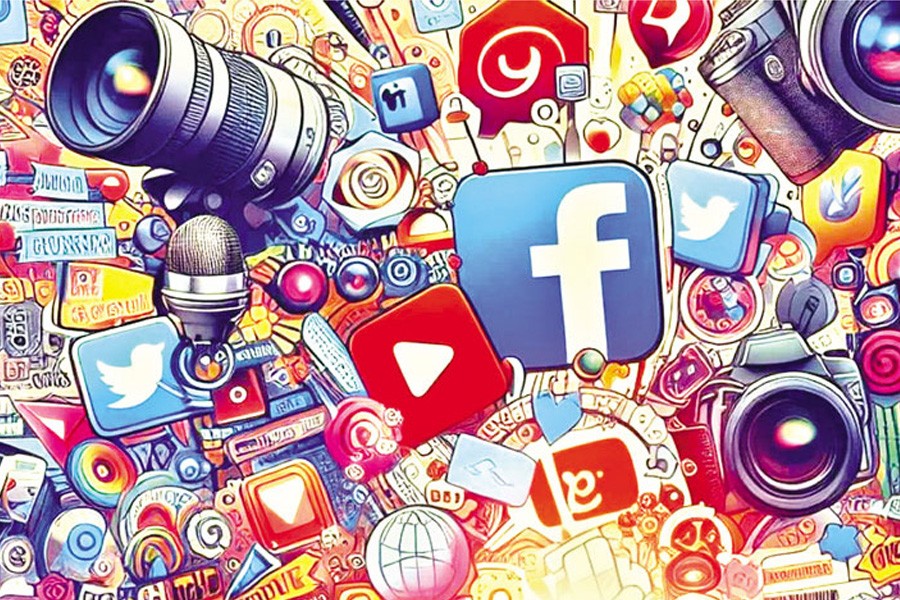
Published :
Updated :

Recently, the whole country faced an internet blackout. An internet blackout is exactly what it reads-no internet for anything, not even the basics, like downloading a movie. For a generation that depends on their mobile phones for almost any kind of networking, it sure sounds nightmarish. But is it truly something that should make them so restless that they forget what basic human life can be passed?
Well, of course, the question could be answered, but it's complicated and requires a lot of thought. The Internet has changed almost everything about life, and different age groups react differently to the absence of it. The young have grown up with the Internet and computers in various manifestations. Our boomer generation only got their computers once they were above their forties, and our grandparents have barely ever used them. Over time, the Internet became a main source of news, commentary, feature stories, and good, in-depth writing. Not to mention, every kind of information is available through innumerable websites, and now, there is a virtual galaxy of apps.
This generation, Gen Z, has grown up with devices, and the internet has been accessible to them from a young age. Hence, they are immersed in the internet world for almost every connectivity work. From the simplest queries to detailed reports, and from getting connected with every nook and corner of the world - it is nothing for the web. These people, labelled as 'digital natives,' have grown up with the internet as an inseparable part of their lives. When the connection is severed, it may feel like losing a limb.
With the internet gone, there was a void all over the country. The greatest pit this time was the disconnection that emerged at a time when it indeed was connecting with intent. This void of information made it difficult for the generation submerged in social media, gasping to reconnect, forced to be in a time they haven't collectively been to -- the days before the internet was 'an essential.'
In pre-Internet times, there was mass media controlled by three large broadcasting networks, which decided what news and entertainment we could see or hear, and newspapers in every city and many towns which determined what news people would read in newspapers, which in addition to TV and radio, were the only games in town. This was the whole communication method that connected people from one corner to another collectively, except telephones.
Connectivity was still essential when the internet was not the prime medium. There would be regular telephone calls that consisted of hours with friends and families. There would be meetups regularly, and life updates would not just be about life events or statuses on social media. So, one has to be socially active to be social and connected to others. The Internet or social media does that for us without moving from our places. It may have made things a lot easier, but it has also made us addicted to the essentiality of it. A whole generation has started to feel powerless without it, where, in reality, its connectivity results from people and their will.
Beyond the obvious inconveniences of being unable to stream, shop, or communicate instantly, the internet blackout creates a psychological disconnect. It's a sudden removal of the familiar, the comforting hum of notifications, the endless scroll of information, and the constant social media validation. This fast and unexpected change can trigger feelings of isolation, anxiety, and even a sense of purposelessness. Also, this sense of loss in getting connected forces us to confront a reality that makes us feel increasingly alien - boredom. Without digital distractions, we're left alone with our thoughts, which can be overwhelming for those accustomed to the constant external input. But at times of need, this can be suffocating, with the fear of uncertainty.
But although it is a time of frustration, the olden days can be a reference of guidance here. It presents an opportunity for reflection and rediscovery. It can encourage reconnection with the physical world, engage in face-to-face interactions, and explore hobbies and interests that have been neglected in the pursuit of digital gratification.
This growing frustration and the restlessness experienced during an internet blackout can be symptoms of increasing dependence on technology and the internet. It's a reminder of how deeply intertwined our lives have become with the digital world, and this dependency may be tilted with the adaptation of alternate information sources like newspapers or radio. Traditional methods of communication can be confidently brought into practice without getting restless. Relying on SMS, phone calls, and face-to-face communication is one of the best ways to train the mind to be adaptive. The strength of neighbourhoods can be tested during those times by observing if they come together to connect and exchange information or just let the new toxic train of the molecular family turn the next-door stranger trend run the same.
In the end, let's think of the internet as a tightly woven fabric connecting us all. It's like a big tear in that fabric when it suddenly disappears, leaving people feeling lost and alone. But just like repairing a torn cloth, these broken connections can be mended. By reaching out to each other, sharing stories, and supporting one another, a community's strength and resilience can rebuild our sense of togetherness and discover new ways to connect in times of our direst needs.
nowertahseen@gmail.com


 For all latest news, follow The Financial Express Google News channel.
For all latest news, follow The Financial Express Google News channel.